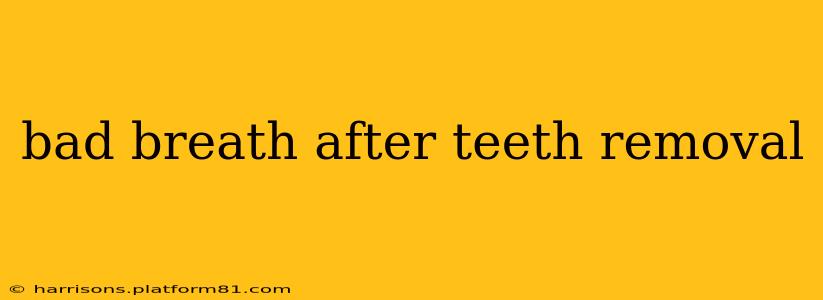Having your teeth removed is a significant oral surgery procedure, and while the focus is often on the healing process, a common side effect that many people experience is persistent bad breath, or halitosis. Understanding the causes of this post-extraction halitosis is key to effectively managing and eliminating it. This comprehensive guide will explore the reasons behind bad breath after tooth removal, provide solutions to tackle the problem, and address frequently asked questions.
Why Does My Breath Smell Bad After Tooth Extraction?
Several factors contribute to bad breath following tooth extraction. The surgical site itself is a breeding ground for bacteria, and the healing process often involves some unpleasant byproducts.
-
Blood Clots and Tissue Debris: The initial days after extraction involve blood clots forming in the socket. As this clot breaks down and tissue heals, a slightly unpleasant odor is possible. This is a normal part of the healing process and typically diminishes as the socket heals.
-
Bacterial Growth: The open wound provides a perfect environment for bacteria to proliferate. These bacteria produce volatile sulfur compounds (VSCs), the primary culprits behind bad breath.
-
Dry Socket: This painful complication occurs when the blood clot dislodges from the extraction site, exposing the underlying bone and nerves. This creates a more significant breeding ground for bacteria and results in a more intense, foul odor.
-
Food Particles: Food particles can get trapped in the extraction site, particularly if the healing process is slow. These particles decompose, contributing to the bad breath.
-
Poor Oral Hygiene: Neglecting oral hygiene after extraction is a major contributor. Bacteria thrive in a dirty mouth, exacerbating the problem.
-
Underlying Medical Conditions: In rare cases, persistent bad breath after tooth extraction could be a symptom of an underlying medical condition.
How Long Does Bad Breath Last After Tooth Extraction?
The duration of bad breath after a tooth extraction varies. Mild bad breath associated with the normal healing process usually subsides within a week or two. However, if bad breath persists for longer or is accompanied by other symptoms like intense pain or swelling, consult your dentist immediately. This could indicate a dry socket or infection.
What Can I Do to Get Rid of Bad Breath After Tooth Extraction?
Addressing bad breath after a tooth extraction involves a multi-pronged approach focusing on maintaining good oral hygiene and promoting proper healing.
-
Gentle Rinsing: Follow your dentist's instructions carefully regarding rinsing. Avoid vigorous rinsing or using a straw, as this could dislodge the blood clot. A gentle saltwater rinse (1/2 teaspoon salt in 8 ounces of warm water) can help keep the area clean.
-
Maintaining Oral Hygiene: Brush and floss gently around the extraction site, avoiding direct contact with the wound. Be sure to continue brushing and flossing the rest of your teeth to prevent bacterial growth elsewhere in your mouth.
-
Diet Modification: Avoid strong-smelling foods and drinks, especially those with pungent aromas like garlic, onions, or alcohol, which can worsen breath odor.
-
Hydration: Drink plenty of water throughout the day. Water helps to flush out bacteria and keep your mouth moist.
How to Prevent Bad Breath After Tooth Extraction?
Prevention is key! Proper oral hygiene before, during, and after the extraction plays a vital role.
-
Pre-Extraction Oral Hygiene: Maintain impeccable oral hygiene in the days leading up to the procedure. Regular brushing, flossing, and dental checkups will contribute to a healthy environment post-surgery.
-
Following Post-Op Instructions: Strictly follow your dentist's post-operative instructions, including pain management and rinsing techniques.
Is Bad Breath After Tooth Extraction a Sign of Infection?
While some bad breath is normal, persistent bad breath accompanied by other symptoms such as severe pain, swelling, fever, or pus could indicate an infection. Seek immediate dental attention if you experience these symptoms.
When Should I Call My Dentist About Bad Breath After a Tooth Extraction?
Contact your dentist if your bad breath persists for more than two weeks, is accompanied by pain, swelling, or other concerning symptoms, or if you have concerns about the healing process.
By understanding the causes of bad breath after tooth extraction and following these preventative and remedial steps, you can ensure a smoother, less pungent recovery. Remember, if you have any concerns, always consult your dentist for professional advice.
